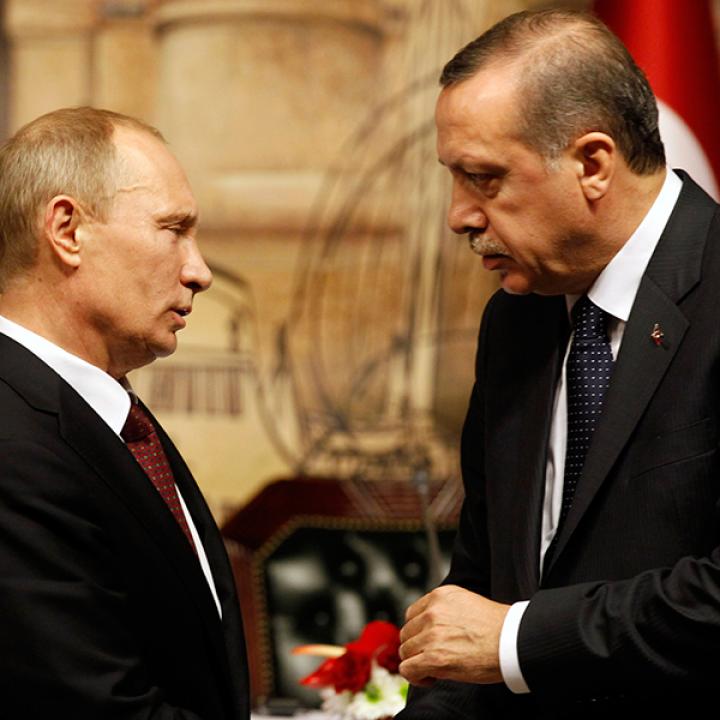
- Policy Analysis
- Policy Alert
The Sochi Summit: Potential Outcomes and Implications

As Washington pushes Erdogan to act responsibly in northeast Syria, the Turkish leader may face contrary pressures from Russia and Iran, who are keeping forces on the ground to back up whatever demands are made at this week’s summit and beyond.
On October 22, Vladimir Putin will host a summit on Syria with Turkish president Recep Tayyip Erdogan. In light of President Trump’s recent decision to withdraw U.S. forces, will they and Iran—the three remaining foreign military players on the scene—usher in a sustainable bargain regarding Syria’s political future? Or will they simply facilitate its continued use as a battleground to drive their own agendas?
PUTIN’S LEVERAGE OVER ERDOGAN
Moscow’s public reaction to the announced U.S. departure was a combination of glee that Washington intends to leave, doubt that the withdrawal is real, and reservations about Turkey’s subsequent incursion. As much as Putin wants the United States out, he has been trying to open the next phrase of Syria diplomacy for months now, with the aim of brokering a resolution on his terms—namely, ending the fighting while ensuring that Bashar al-Assad stays in power. The cross-border Turkish offensive risks spoiling these plans.
Accordingly, as Ankara began its offensive against the Syrian Kurdish People’s Defense Units (YPG) two weeks ago, Russia deployed a small contingent of military police to serve as a buffer, then began negotiations with the YPG and the Assad regime. Shortly after, Assad’s troops moved into Kurdish-controlled areas such as Manbij, placing local Russian forces and proxies in the middle of a potential clash between the Turkish and Syrian militaries.
Putin has long been careful to conduct the Syria intervention in a way that does not get Russia bogged down, but the ghost of the Soviet experience in Afghanistan is always looming in the background. Meanwhile, a recent Levada Center poll indicated that 55 percent of the Russian public would prefer to end the intervention altogether. To ease this pressure while still shaping events in a manner favorable to Moscow, Putin has worked to build leverage over Erdogan for years, from selling him S-400 missile defense systems, to building the country’s first nuclear power plant, to expanding how much Russian media outlets such as Sputnik broadcast in Turkey. From this perspective, it is telling that the start of Erdogan’s campaign in Syria coincided with a new Russian-Turkish agreement to conduct trade in their national currencies.
Putin’s leverage in Sochi and beyond will also be augmented by the fact that regional actors have grudgingly come to view Moscow as a more reliable partner than Washington. Taking advantage of this perception and the latest U.S. withdrawal, Moscow will likely offer Erdogan a broader bargain on Syria during the Sochi talks, perhaps pledging to fold the YPG under Assad’s control in return for Ankara recognizing him as Syria’s legitimate leader. Putin may also ask Turkey to vacate Syrian territories that it currently occupies; in response, Erdogan will likely ask Assad to repatriate some of the nearly four million Syrian refugees who still reside in Turkey.
Other tension points may undermine any such deals, however, particularly the future of Idlib. The Assad regime and Russia continue to target this last rebel-held border province with brutal attacks that threaten to send another 2-3 million civilians fleeing into Turkey, potentially creating another refugee crisis for Ankara and Europe similar to that of 2015.
ERDOGAN’S HESITANCE TO CONFRONT RUSSIA AND IRAN
During six centuries of Ottoman rule, the Turks defeated and ruled over all their neighbors except Russia and Iran. This fact still resonates in Turkey’s approach to those two powers. Whereas Ankara can be patronizing in its policy toward other neighbors, dismissing their concerns and interfering in their internal affairs—as seen in Syria—it is highly averse to confronting or ignoring Moscow and Tehran.
In this sense, Turkey’s 2012 decision to support rebels who opposed the Assad regime inadvertently put it on a potential historic collision course with Russia, which entered the war on Assad’s side in September 2015 and responded harshly when Turkey shot down one of its military planes two months later. Ankara has had to tread more carefully since then, frequently consulting with Moscow on Syrian issues via meetings like this week’s Sochi summit.
The failed 2016 coup against Erdogan eased the pressure somewhat by convincing Putin that wooing Ankara was easier than bullying it. Yet this development also established a pattern of transactional, ad hoc deals in Syria, such as Moscow greenlighting Operation Olive Branch, the 2018 military incursion in which Turkey and its proxies captured Afrin from the YPG. In return, Erdogan had to stay quiet while Russia helped the Assad regime bomb civilians in East Ghouta, one of the last remaining rebel-held de-escalation zones.
As for Iran, Ankara has sought to maintain its longstanding power parity with its historical Persian rival, but Turkish support to rebels who oppose Tehran’s proxy, the Assad regime, has come close to upsetting this balance. Currently, Iran’s fortunes and allies are ascendant in Syria, so it will likely attempt to recast relations with Turkey on its own terms in the coming months. This may include demanding that Erdogan cease all support to anti-Assad rebels and withdraw all Turkish troops from Syria.
CONCLUSION
Taken together, these factors suggest that Erdogan will have the weaker hand to play in Sochi. Putin may therefore be able to further his broader goals vis-a-vis Turkey, namely, forcing Erdogan to shake Assad’s hand. If this happens, Putin will further elevate his regional standing and move closer to reestablishing Moscow’s great-power status, all at Washington’s expense.
Anna Borshchevskaya is a senior fellow at The Washington Institute and author of its recent study “Shifting Landscape: Russia's Military Role in the Middle East.” Soner Cagaptay is the Institute’s Beyer Family Fellow and author of the new book Erdogan’s Empire: Turkey and the Politics of the Middle East.




